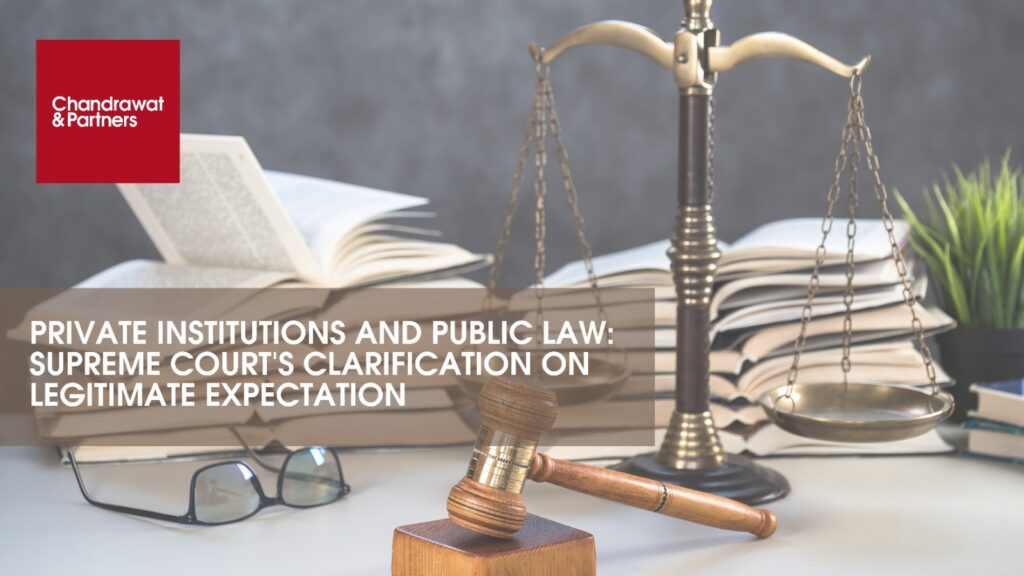Home > Recent Judgements > Private Institutions And Public Law: Supreme Court’s Clarification On Legitimate Expectation
July 31, 2024

BACKGROUND
In the case of Army Welfare Education Society, New Delhi v. Sunil Kumar Sharma & Ors. etc., the Bengal Engineering Group and Centre leased land to the Institute of Brothers of St. Gabriel, where St. Gabriel’s Academy operated a school. After the lease ended, a decision was made to run the school under the Army Welfare Education Society (“AWES”), which operates 139 schools nationwide.
On 28.02.2012, the staff was informed that eligible teachers, per CBSE guidelines, could be considered for a one-year ad hoc appointment. These teachers would need to pass a written test under AWES rules and receive salaries like those of other Army Public School teachers. The Respondents sought a writ of mandamus against the Appellant for not providing them a salary and benefits at par with salaries and benefits received by the Government Teachers.
The Respondents had legitimate expectations that the Appellant would provide the same benefits and salary as received by the government teachers. However, the respondents were not able to prove that there was any express or implied promise made by the appellant regarding keeping their salary and service conditions intact.
ISSUES
- Whether the doctrine of legitimate expectation extend to private unaided institutions?
- Whether practices or implied policies, without formal commitments, are sufficient to establish a claim of legitimate expectation?
JUDGMENT OF THE COURT
The Court found that the teachers failed to prove any express or implied promise by the institution regarding salary parity with government teachers. The dispute had arisen immediately after the appellant took over the administration of the school, with no prior negotiations or dealings between the parties. Moreover, there was no statutory obligation requiring the institution to provide salaries equivalent to those in government institutions.
The bench concluded that the doctrine of ‘legitimate expectation’ did not apply in this case. They emphasized that the appellant, as a private institution, could not be regarded as a public or government authority. Consequently, the teachers could not claim a legitimate expectation based solely on the Appellant’s actions or policies.
ANALYSIS
This marks as a significant judgment by the Supreme Court of India to clarify the doctrine of ‘legitimate expectation’. This doctrine protects against arbitrary actions of public authority as it is based on public law. Based on previous rulings like Union of India v. Hindustan Development Corporation and Ram Pravesh Singh v. State of Bihar, the ruling expounds upon the fundamental components and constraints of this legal doctrine.
Doctrine of Legitimate Expectation
The doctrine of legitimate expectation is a principle that protects individuals from arbitrary decisions by public authorities. It arises when a public authority makes a representation or follows a consistent practice, leading individuals to expect a certain treatment.
However, the Supreme Court’s recent judgment emphasizes that not all expectations qualify as legitimate under this doctrine. The Court outlined several critical features that must be present for a legitimate expectation to be legally recognized:
- Foundation on a Right:
A legitimate expectation cannot just be predicated on a wish, hope, or anticipation, it must be grounded in a right. This differentiation guarantees the protection of only expectations that have a solid basis in established practices or a legal foundation.
- Arising from Promises or Consistent Practices:
The expectation must stem from either an express or implied promise, or from a consistent past practice or custom followed by an authority. This element underscores the need for a clear and predictable standard of behavior from public authorities.
- Exclusion of Unreasonable Expectations:
Expectations based on sporadic, casual, or random acts, or which are unreasonable, illogical, or invalid, do not qualify as legitimate. This criterion helps to prevent frivolous or baseless claims of legitimate expectation.
- Application in Substantive and Procedural Matters:
People can contest actions that depart from established traditions or commitments, whether in decision-making procedures or results, under this doctrine, which applies to both substantive and procedural matters.
- Scope within Public Law:
Legitimate expectation is firmly situated within the realm of public law. It can be invoked when a public authority breaches a promise or deviates from consistent past practice without reasonable cause, highlighting its role in ensuring fairness in administrative actions.
- Requirement of Prior Dealings or Legal Relationship:
The doctrine can only be invoked by individuals who have had dealings or negotiations with the public authority, or who have a recognized legal relationship with it. This prevents total strangers to authority from claiming legitimate expectations based solely on a general duty of fairness.
The Supreme Court’s judgment in the present case provides a crucial clarification on the scope and applicability of the doctrine of legitimate expectation, particularly in the context of private unaided institutions. The Court held that the doctrine does not extend to such institutions unless there is an express or implied promise or consistent past practice that creates a legitimate expectation. In this case, the lack of any statutory obligation or clear promise regarding salary parity with government teachers meant that the teachers’ claims were not supported by the doctrine.
The ruling underscores the necessity for a well-founded legal basis, such as a right or established practice, to sustain a claim of legitimate expectation. It emphasizes that the doctrine is applicable strictly within the realm of public law, ensuring protection against arbitrary actions by public authorities, and is not meant to impose similar standards on private entities without appropriate legal grounds. This judgment thus reinforces the boundaries of legitimate expectation and serves as an important precedent for future cases involving claims of expectations from both public and private bodies.
For more information or queries, please email us at
enquiries@chandrawatpartners.com




